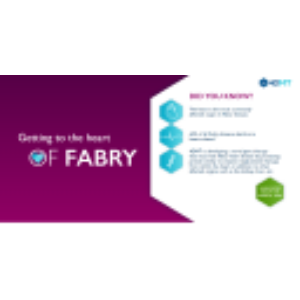4D Molecular Therapeutics Announces Interim Clinical Data from On-going Phase 1/2 Clinical Trial of Intravitreal 4D-150 for Wet Age-Related Macular Degeneration (wet AMD)
Rhea-AI Summary
4D Molecular Therapeutics (Nasdaq: FDMT) announced promising interim data from cohort 1 of their Phase 1/2 clinical trial of 4D-150 for wet AMD, showcasing a 96.7% reduction in the annualized anti-VEGF injection rate. The trial involved 5 patients who had a high pre-treatment injection rate. Notably, 80% of these patients remained injection-free for up to 10 months post-treatment, with no significant safety concerns reported. The company plans to move into randomized Phase 2 enrollment in Q1 2023, further validating the potential of their innovative gene therapy.
Positive
- 96.7% reduction in annualized anti-VEGF injections in cohort 1 patients.
- 80% of patients remained injection-free for up to 10 months post-treatment.
- No serious adverse events reported, demonstrating good safety and tolerability.
Negative
- None.
News Market Reaction 1 Alert
On the day this news was published, FDMT gained 7.83%, reflecting a notable positive market reaction.
Data tracked by StockTitan Argus on the day of publication.
- Cohort 1 patients (n=5) received a single intravitreal injection of 4D-150 (3E10 vg/eye); these patients were high need patients who in the 12 months preceding trial enrollment had a mean annualized anti-VEGF injection rate of ~11
- Following intravitreal 4D-150, Cohort 1 patients’ annualized anti-VEGF injection rate was reduced by
96.7% 80% of Cohort 1 patients had not received any supplemental aflibercept injections for up to ~10 months after 4D-150 dosing- Cohort 1 safety and tolerability of 4D-150 demonstrated to date, with no clinically significant intraocular inflammation or hypotony reported
- Conference call & webcast to be held Monday November 14, 2022 at 8:00 AM E.T.
EMERYVILLE, Calif., Nov. 14, 2022 (GLOBE NEWSWIRE) -- 4D Molecular Therapeutics, Inc. (Nasdaq: FDMT), a clinical-stage biotherapeutics company harnessing the power of directed evolution for targeted genetic medicines, announced interim clinical data from cohort 1 of the Phase 1/2 clinical trial of intravitreal 4D-150 for wet AMD. The data focused on safety, tolerability, aflibercept transgene expression and anti-VEGF clinical activity of the 4D-150 genetic medicine in patients enrolled in cohort 1 (n=5; 3E10 vg/eye); the data cutoff date was October 13, 2022. 4D Molecular Therapeutics will host a conference call today, Monday November 14, 2022 at 8:00 AM E.T. to discuss the interim clinical data.
“This clinical data on 4D-150 marks an important milestone for 4DMT,” said David Kirn, M.D., Co-founder and Chief Executive Officer of 4DMT. “We are developing 4D-150 for the treatment of large and sustainable markets in ophthalmology, including wet AMD and diabetic macular edema. We believe these results further validate the potential for both our intravitreal R100 vector for other large market eye diseases, and our Therapeutic Vector Evolution platform as an engine to grow our product pipeline.”
Arshad M Khanani, M.D., M.A., FASRS, Managing Partner and Director of Clinical Research at Sierra Eye Associates, Clinical Associate Professor at University of Nevada, Reno, and a Principal Investigator in the 4D-150 PRISM clinical trial, added, “In the ongoing Phase 1/2 PRISM trial, I’m encouraged by the excellent safety and tolerability of intravitreal 4D-150 in patients with wet AMD. At the low dose of 3E10 vg/eye, we have seen a clinically significant reduction in annualized anti-VEGF injection rate in high need patients who previously required very frequent anti-VEGF injections. Utilizing a novel R100 vector and a dual transgene payload, 4D-150 is the first retinal gene therapy that is designed to inhibit all four VEGF-related molecules that drive angiogenesis. I am looking forward to enrolling patients in the randomized Phase 2 expansion stage of this clinical trial.”
Background on 4D-150
- The 4D-150 product candidate comprises a dual transgene payload, expressing aflibercept and an anti-VEGF-C RNAi, and the proprietary vector R100 for low dose intravitreal delivery.
- R100 was invented at 4DMT through the Nobel Prize-winning technology, directed evolution (Therapeutic Vector Evolution platform), for intravitreal delivery, penetration through the internal limiting membrane barrier, and efficient transduction and transgene expression within retinal cells in a broad distribution across the entire retina.
Phase 1/2 Clinical Trial Design with Intravitreal 4D-150 in Patients with Wet AMD
- This Phase 1/2 clinical trial consists of a Dose Exploration stage followed by a randomized Phase 2 stage in which patients will be randomized to one of two doses levels of 4D-150 vs aflibercept in a 2:2:1 ratio (n=50 patients).
- The Dose Exploration stage has now been completed with three cohorts enrolled (5 patients in each cohort; 15 patients total) and all three dose levels were cleared for safety by a Data Safety Monitoring Committee.
- Each patient received a single intravitreal dose of 4D-150. Topical corticosteroids were administered and tapered over 20 weeks.
- Cohort 1 patients received an intravitreal 4D-150 dose of 3E10 vg/eye. All data below are as of the data cutoff date of October 13, 2022.
Cohort 1 Clinical Safety Results
- 4D-150 was safe and well tolerated to date, with no serious adverse events or dose-limiting toxicities reported.
- No clinically significant intraocular inflammation, no endophthalmitis, no retinal vasculitis, no retinal artery occlusion, no choroidal effusions and no hypotony were reported to date.
Cohort 1 Clinical Aflibercept Biomarker Results
- 4D-150-mediated expression of the aflibercept transgene protein was demonstrated in the aqueous humor of the eye at 12 weeks after 4D-150 injection in all patients’ samples evaluated to date (n=3). In all three patients, aflibercept concentrations were in a therapeutically active range.
Cohort 1 Clinical Activity Data
- The mean annualized anti-VEGF injection rate in the 12 months prior to 4D-150 treatment was ~11 in cohort 1, indicating that these were high need patients requiring frequent injections.
- Following intravitreal 4D-150, the annualized anti-VEGF injection rate was reduced by
96.7% . 80% of patients have remained anti-VEGF injection-free, meaning they have not required any supplemental aflibercept injections to date, with follow up to date of ~40, 36, 32 or 16 weeks.
Future Directions for 4D-150 & the R100 Intravitreal Vector
- We expect to initiate enrollment of the randomized Phase 2 stage of the trial in Q1 2023. Based on data to date, we expect that the dose levels to be studied will be in the range of 3E10 to 1E10 vg/eye.
- We expect to release additional clinical data from all three Dose Exploration cohorts on this trial in Q2 2023.
- We are actively developing additional preclinical pipeline product candidates for other large market diseases leveraging our R100 intravitreal vector.
Conference Call Information
4D Molecular Therapeutics will host a conference call and live webcast on November 14th, 2022 at 8:00 AM E.T. Registration and dial-in for the conference call can be accessed through 4D Molecular Therapeutics website under Events & Presentations in the Investors section through the following link: https://ir.4dmoleculartherapeutics.com/events. An archived replay of the webcast will be available following the event.
About 4D-150 and Wet AMD
4D-150 is comprised of our targeted and evolved intravitreal vector, R100, and a payload that expresses aflibercept and a VEGF-C RNAi. This dual transgene payload inhibits 4 angiogenic factors: VEGF A, B, C and PlGF. 4D-150 is designed for low dose intravitreal delivery. Wet AMD is a type of macular degeneration where abnormal blood vessels (choroidal neovascularization or CNV) grow into the macula, the central area of the retina. As a consequence, CNV causes swelling and edema of the retina, bleeding and scarring, and causes visual distortion and reduced acuity. The proliferation and leakage of abnormal blood vessels is stimulated by VEGF. This process distorts and can potentially destroy central vision and may progress to blindness without treatment.
About 4DMT
4DMT is a clinical-stage biotherapeutics company harnessing the power of directed evolution for targeted genetic medicines. 4DMT seeks to unlock the full potential of genetic medicines using its platform, Therapeutic Vector Evolution, which combines the power of directed evolution with approximately one billion synthetic AAV capsid-derived sequences to invent targeted and evolved vectors for use in our products. The company is initially focused on five clinical-stage products in three therapeutic areas for both rare and large market diseases: ophthalmology, cardiology (including Fabry disease) and pulmonology. The 4DMT targeted and evolved vectors are invented with the goal of being delivered at relatively low doses through clinically routine, well tolerated and minimally invasive routes of administration, transducing diseased cells in target tissues efficiently, having reduced immunogenicity and, where relevant, having resistance to pre-existing antibodies. The five 4DMT product candidates in clinical development are: 4D-150 for wet AMD and DME, 4D-310 for Fabry disease, 4D-710 for cystic fibrosis, 4D-125 for XLRP and 4D-110 for choroideremia.
4D-150, 4D-310, 4D-710, 4D-125 and 4D-110 are in clinical trials and have not yet been approved for marketing by the US FDA or any other regulatory authority. No representation is made as to the safety or effectiveness of 4D-150, 4D-310, 4D-710, 4D-125, and 4D-110 for the therapeutic use for which they are being studied. 4D Molecular Therapeutics™, 4DMT™, Therapeutic Vector Evolution™, and the 4DMT logo are trademarks of 4DMT.
Forward Looking Statements
This press release contains forward-looking statements within the meaning of the Private Securities Litigation Reform Act of 1995, as amended, including, without limitation, implied and express statements regarding the therapeutic potential and clinical benefits, as well as the plans for the clinical development of 4D-150. The words "may," “might,” "will," "could," "would," "should," "expect," "plan," "anticipate," "intend," "believe," “expect,” "estimate," “seek,” "predict," “future,” "project," "potential," "continue," "target" and similar words or expressions are intended to identify forward-looking statements, although not all forward-looking statements contain these identifying words. Any forward looking statements in this press release are based on management's current expectations and beliefs and are subject to a number of risks, uncertainties and important factors that may cause actual events or results to differ materially from those expressed or implied by any forward-looking statements contained in this press release, including risks and uncertainties that are described in greater detail in the section entitled "Risk Factors" in 4D Molecular Therapeutics’ most recent Quarterly Report on Form 10-Q, as well as any subsequent filings with the Securities and Exchange Commission. In addition, any forward-looking statements represent 4D Molecular Therapeutics' views only as of today and should not be relied upon as representing its views as of any subsequent date. 4D Molecular Therapeutics explicitly disclaims any obligation to update any forward-looking statements. No representations or warranties (expressed or implied) are made about the accuracy of any such forward-looking statements.
Contacts:
Media:
Katherine Smith
EvokeCanale
Katherine.Smith@evokegroup.com
Investors:
August Moretti
Chief Financial Officer
amoretti@4dmt.com









